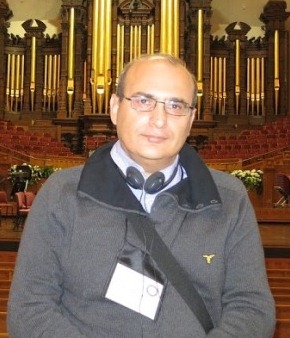Armenia and Georgia

Robert F. Orton, Europe Area Research Manager
Stepan Danielyan, Armenia, is current editor-in-chief of both Religion and Society, a scientific journal, and the Religions in Armenia website (www.religions.am). He also serves as chair of “Collaboration for Democracy,” an NGO operating from Yerevan, and is a former producer and political commentator for Armenian National TV and author of more than 400 articles and interviews in international and local magazines. We are witnessing in Armenia, said Mr. Danielyan, the convergence of state with the national church which, along with other majority churches, aspire to an evolution into religious monopolies. As a result, churches have become the target of widespread criticism by society as reflected in proposed legislation which threatens religious freedom. Included in this legislation is reference to proselytism (“soul hunting” as viewed by prior law) in which all religious organizations, other than the dominant Holy Apostolic Armenian Church, are openly defined as sects, the followers of which are seen by the government and the public at large as betraying the cultural and traditional belief of Armenians. Additionally, the concept of compulsory registration which holds that if the number of members of a sect exceeds 25 it must register and submit periodic reports under supervision, with the threat of fines, prohibition of activities, and even suspension. Another problem presented by the proposed legislation is the public education system in which only the system of belief of the Holy Apostolic Armenian Church is permitted, despite the fact that Armenia is a secular state and preaching and teaching religion at schools is prohibited by the constitution. Another issue is the threat of dismissal of employees from work because of religious belief. The current legal framework and evolving domestic practice seriously jeopardize the freedom of thought, conscience and religion, as well as the freedom of expression of opinion and association and the right to be free of discrimination.
Marine Solmonishvili, Georgia, is President, LEA International Foundation and Georgian-Jewish Information Center, and a Faculty Member of Journalism at the Moscow Central Scientific Research Institute of Education. Since 2005 she has been an Expert at the Council of Ethnic Minorities of the Office of Public Defender (ombudsman) of Georgia. She is also a prolific writer and publisher of articles and various projects. eorgia is a member of the UN, the Council of Europe and the World Trade Organization, and aspires to membership in the European Union. The Georgian Apostolic Church historically enjoyed specifically defined rights in Georgia, while rights, if any, of other churches were ill defined or not defined at all. Russian Orthodox, Islam, Judaism, Evangelic Baptist and Evangelic Lutheran adherents have, however, been present in limited numbers. On July 5, 2011, the civil law was amended to provide for the registration of other groups as legal entities with the same rights as the Apostolic Church; however, the law is subject to interpretation which has, in fact, almost abrogated the rights which the law gives. So, the law, on its face, appears helpful, but does not afford the rights intended. The law does not specify which churches recognized by the Council of Europe are recognized in Georgia. Those churches not specifically recognized are viewed a sects. The hope by many is that additional laws will be enacted, such as those in force in the United States, which will serve to promote religious freedom. The concept of toleration was introduced by parliament in 2009, with the purpose of protecting the cultural heritage of all minorities; however. the Georgian Apostolic Church remains the basic religion in Georgia. The use of Jewish and Islamic buildings were, in recenyears, restored to those religious organizations and their repurchase from the government appears possible; however, the process is extremely onerous.